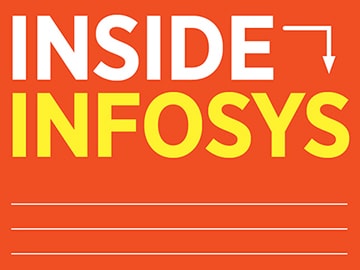
Nilekani's return brings positivity but does not resolve strategic dilemma: Everest Group CEO
For long-term success, Infosys, under Nilekani and the next CEO, will have to clearly communicate to all stakeholders on exactly where it stands in the market
 Image: Vivek Prakash/ Reuters
Image: Vivek Prakash/ Reuters
Co-founder Nandan Nilekani’s return to Infosys signals a commitment from the board to try and heal the divide between board members, board and founders and internally within the ranks of Infosys employees. Clearly, Infosys needs to bring these stakeholders together and present a united front to the Industry, shareholders, and clients.
Vishal Sikka and his board supporters stepping down is not unexpected. Once Vishal resigned it was only a question of time before the board members he put in place moved on. While it’s too early to say, this could signal a major change in direction; it will depend on who replaces the board members who have stepped down and who the next CEO is.
However, appointing Nilekani as non-executive Chairman and the resignation of the other Sikka board members does not of itself resolve the underlying issues which caused this split. At the center of this problem is a strategic dilemma that Infosys faces, and opposing views on how Infosys should move forward.
Infosys faces a market which is changing from one based on labor arbitrage to one which is driven by digital technologies. The labor arbitrage market is still far larger (75 percent of the market) and far more profitable than the digital market which is now 25 percent of the total market.
Clients are seeking two kinds of partners, in the labor arbitrage market they are looking for great execution at a lower price — this will cause the market to consolidate. In the digital markets, they are looking for new business models based on technology, not labor arbitrage, and a partner which can take them down this road.
The problem for Infosys and where the different sides have very different opinions is what role the IT major should play and how it should play it. NR Narayana Murthy and the stakeholders who rally around him look for Infosys to continue its long standing culture and strategies around being an arbitrage leader.
They believe that the new digital market will revert to an arbitrage model and Infosys only needs to execute better in the old model to continue to be an industry leader. A substantial part of the board and Vishal believe that Infosys should change its culture and business models to accommodate the new digital realities and must rotate as much of its business as quickly as possible into these new digital business models.
Appointing Nilekani as vice chairman does not resolve this strategic dilemma, however it also does not worsen it. From a client point of view, this is a non event. If Nilekani can ease tensions amongst the stakeholders that will be welcome, but it does little to resolve the question of which partner Infosys should be positioned as.
Vishal had stood for a strong rotation into a digital business model and this may be seen as a step back from this vision. However, Vishal’s strong stance around technology-based business models was causing some concern around the positioning of Infosys as the right ongoing arbitrage player.
In short I can’t see Nilekani being a long-term answer for Infosys. His presence in and of its self is probably positive as it leads to a more unified board and founder coalition. However, it may delay Infosys coming to grips with the very hard strategic choices it faces, and if this is the case then it will hurt Infosys in the medium to long run.
Infosys faces some hard choices and the longer it takes to come to grips with them the worse it will be for them. Hopefully Nandan can play a constructive role in this, but as well look to history. Murthy was unable to resolve these issues when he was brought back. Hopefully this will not be the case this time.
The author is CEO of Everest Group. Views expressed are personal.
ALSO READ:

- Murthy is a hero. Yet, he faltered




